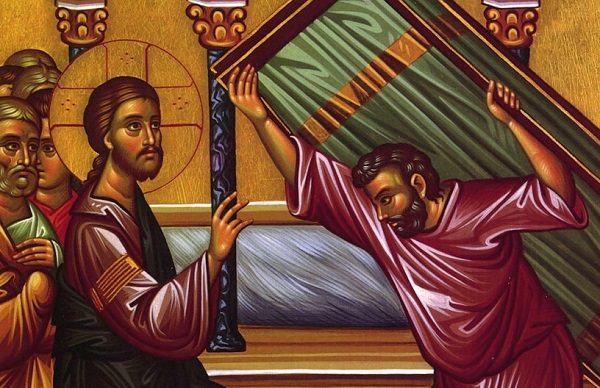‘Be strong, you feeble knees’ (Matth. 9, 1-8)
25 July 2022It’s said that, at one time, King Louis XI of France (1423-1483) fell seriously ill and summoned a priest to say intercessory prayers for his recovery. Apart from the supplication ‘for health’, the priest also prayed ‘for the forgiveness and remission’ of the king’s sins. By and large, Louis was a kindly person who had welcomed many Roman [i.e. ‘Byzantine’] refugees after the fall of Constantinople, but he was annoyed by this and interrupted the priest, saying: ‘Father, don’t confuse matters. Now just ask God to make me well. We’ll see about the rest later’.
Prioritization of requests
Fortunately, the paralytic in today’s Gospel reading and those people who brought him to Christ didn’t react in the same way when they heard the Lord say to him: ‘Be of good courage. Your sins are forgiven’. They certainly didn’t have the shallow mind of the French king, who didn’t realize that the confusion didn’t lie in the words of the priest, but in his own superficial understanding. Christ dispelled such confusion when he said: ‘But seek first the kingdom of God and his judgement and all these other things will also be given to you’ (Matt. 6, 33). God’s judgement is to justify us and to free us of reproach and condemnation for our sins. This is why the Church’s main request isn’t ‘for health’, but ‘for remission of sins’.
It’s a wretched thing for people to turn to God only for worldly matters. Such requests aren’t merely displeasing to God, but, in the end, are sinful, even if they’re made on bended knee. Because we must entreat God in accordance with his holy will. And the first thing God wants is for ‘everyone to be saved and come to knowledge of the truth’. (1 Tim., 2, 4).

The straightforward and the perverse
When Christ healed the paralytic, having first forgiven his sins, he not only gave convincing evidence of his divinity, but also showed that the Pharisees were suffering from a paralysis even worse than that of the man who’d been cured, because they ‘reason cunningly in their hearts’. Their devious attitude blinded them and robbed them of the opportunity to stand up and ‘walk’ towards the true faith. The Spirit of God said to these devious people: ‘If you walk perversely towards me, I will also walk with you with a perverse mind’ (Lev. 26, 23-24). In other words: ‘If you continue to live in a devious, rather than a straightforward, manner, then I’ll behave towards you in a way that will seem equally perverse’.
On the other hand, the people who brought the paralytic and, clearly, the man himself were ‘forthright of heart’ and had a sincere faith which didn’t leave Christ unmoved. The Gospel text says that the Lord had mercy on the paralytic ‘when he saw their faith’. It was such faith on the part of certain people- parents, friends, spiritual guides and brothers and sisters- that brought us, also, to Christ. We owe them profound and life-long gratitude. And the more we realize that we’re constantly at risk of spiritual paralysis, the more we should seek ‘stretcher-bearers’ and guides who will lead us firmly to Christ. We have great need of shepherds who will support us. In the words of the Prophet Isaiah (35, 3-5): ‘Be strong, you exhausted hands and feeble knees… Be strong and do not fear. Behold, our God … will come and save us’. That is to say, ‘Take strength, you hands that are weakened and knees that are paralyzed. Take strength, and don’t be afraid. Look, our God’s coming and will save us’.
The miracle of a poster
Sometimes God calls upon and enables us, too, to perform the saving task of healing ‘paralytics’ in ways we could never imagine. The following is an example of this.
The young people at a certain Youth Center organized an event dedicated to the late Papa-Efraim Katounakiotis [now Saint], part of which was a photograph of the Elder which they’d made into a poster. A week before the event, a group of these young people were in a main street in the city and they saw a young man who’d stopped his motor-bike and was embracing a lamp-post. They went up and saw him kissing the face of the Elder in the poster and talking to him, weeping copious tears. They asked him what he was doing and he replied that the look on this unknown elder’s face had spoken directly to his heart. Until then he’d led a very unstable life and been in a lot of trouble. He was on the brink of despair. When he saw this unknown figure, he was shaken to the core and decided to change the way he was living. He asked the young people where this elder was and they told him he’d departed this life. When he heard this he sat down on the pavement and sobbed.
The great miracle had taken place. The young man sought out a spiritual guide and now, today, is living an attentive, spiritual life. The vibrant look from an inanimate poster, attached to a lamp-post by some young people, got a ‘paralyzed’ man to his feet and set him on the path of salvation.






